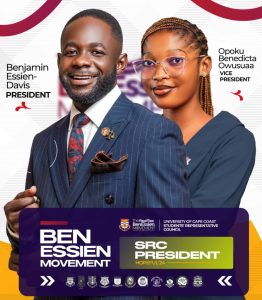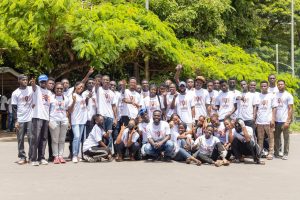 UCC House of Parliament was nearly drawn into verbal altercation on Thursday, February 19, 2015 when members took turns to debate on a possible upward adjustment of CGPA from 2.5 to 3.0 as the minimum qualification for candidates who wish to contest student leadership positions.
UCC House of Parliament was nearly drawn into verbal altercation on Thursday, February 19, 2015 when members took turns to debate on a possible upward adjustment of CGPA from 2.5 to 3.0 as the minimum qualification for candidates who wish to contest student leadership positions.
Majority leader, Robert Ubindam spoke fiercely against any such attempt and believed it would gag out students who might have leadership potential from contesting student leadership positions.
He believed inasmuch as aspirants must endeavor to have good CGPA’s, he opted against such unilateral decision.
Mr. Ubindam said it had become a historical fact that students who had leadership ambitions often committed little seriousness to their books but committed vast majority of their time campaigning and urged such aspirants to desist from such behavior.
The Deputy Majority leader, Ernest Opoku Nti shared a similar sentiment and argued that any attempt by the university authorities to change the criteria for qualification into student leadership by purging the minimum qualification at a CGPA of 3.0 would not be the best decision, adding that “equal chances must be given to both average and excellent students to explore their leadership potentials”.
Members from the Minority bench also supported their colleagues from the Majority bench.
The House therefore unanimously agreed that the university authorities should not make any attempt to push for such an agenda of purging the minimum qualification to contest SRC positions to 3.0 instead of the current 2.5.
In his closing remarks, the Speaker of Parliament, Bikinteeb Nanang reiterated that the House appreciated the fact that many student leaders, after assumption of office, had their CGPA dipped owing to the numerous task they performed, but was of the view that since every university admit second class lower for post-graduate studies, it would be unfair if students with the same qualifications were denied opportunity of contesting student leadership positions.
He further indicated that in some departments and colleges, it was often difficult for students get good CGPA and therefore any attempt to demand a CGPA of 3.0 or better before qualifying to contest student leadership positions would be a slap on the face of such students who found themselves in “difficult” departments or colleges.
The Speaker concluded that first class or second class upper was not a guarantee of productivity and therefore it would be unfair to judge someone’s competence only on the basis of CGPA.
He however urged students who had leadership ambitions to work hard to secure better CGPA’s to enable them graduate with better classes even if they became leaders.
On the substantive issue about the erratic power outages, Deputy Minority leader, Hon. Adofo Osei argued that the university had no excuse in providing a stable power system for the university.
He said that there were many alternative sources of power such as biogas which the university could take advantage of without having to rely on the national grid.
The Deputy Minority cited a small town called Apolonia and Mfantsepim School, who had experimented those method and could enjoy power 24/7 and therefore it was a high time the university opted to solve the power crises through those alternative means.
The House unanimously supported his suggestion
The House remains adjourned until Thursday, February, 27, 2015.




